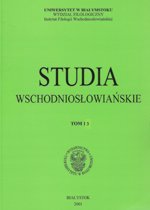Kategoria pustki w światopoglądzie powieści Mały palec Buddy Wiktora Pielewina
The Category of Emptiness in Philosophy of the Novel Buddha’s Little Finger by Victor Pelevin
Author(s): Ewa PańkowskaSubject(s): Studies of Literature, Recent History (1900 till today), Russian Literature, East Asian Philosophy, Indian Philosophy
Published by: Wydawnictwo Uniwersytetu w Białymstoku
Keywords: emptiness; freedom; Zen Buddhism; postmodernism;
Summary/Abstract: Victor Pelevin’s novel Buddha’s Little Finger (known in Russia as Chapayev and Void), first published in 1996, is the subject of an analysis in this article. The book is set in two different times: after the October Revolution and in modern Russia (Moscow in the nineties of the 20th century). The novel is written as a first-person narrative of Pyotr Void. In the post-revolutionary period Pyotr unexpectedly finds himself in the midst of the 1918–1919 civil war in Russia, serving as a commissar to the legendary Bolshevik commander Vasily Ivanovich Chapayev. In Moscow in the 1990s Pyotr is a patient of a psychiatric hospital. Pelevin is creating alternative personalities of true people. In Pelevin’s version the legendary Red Army commander Vasily Chapayev is the philosopher, the expert of Buddhism, after all he appears as Buddha’s reincarnation. Legendary Pet’ka, a batman of the red commander, an infantile enthusiast of the revolution, is transforming into Pyotr Void, a poet-modernist. The main purpose of the paper is to present some philosophical truth (“Pelevin’s philosophical theory”) based on assumptions of solipsism, sending to Immanuel Kant’s views, but also referring to Buddhism (in particular to Zen Buddhism), above of all to the Buddhist concept of emptiness – “sunyata” which refers to the absence of inherent existence in all phenomena.
Journal: Studia Wschodniosłowiańskie
- Issue Year: 2014
- Issue No: 14
- Page Range: 65-87
- Page Count: 23
- Language: Polish

